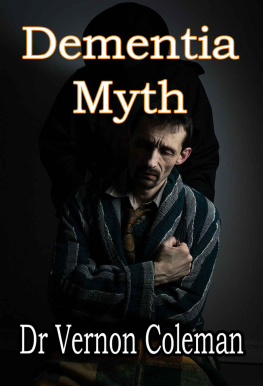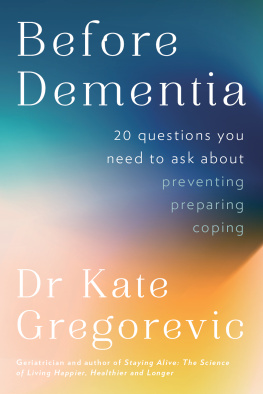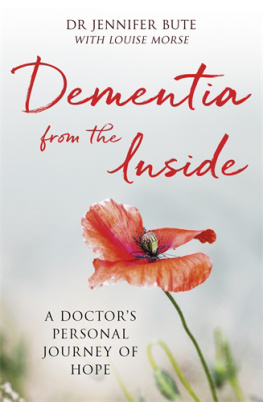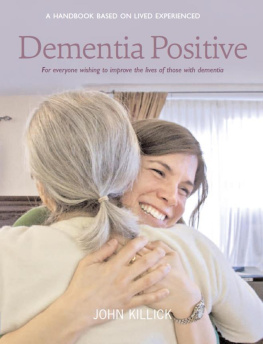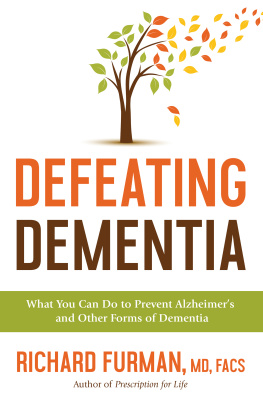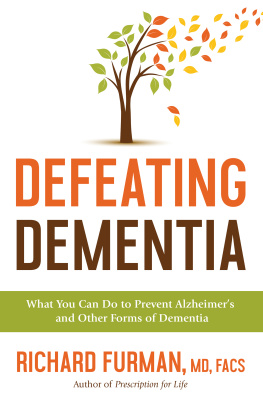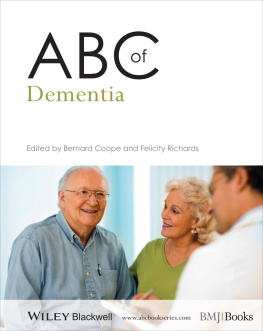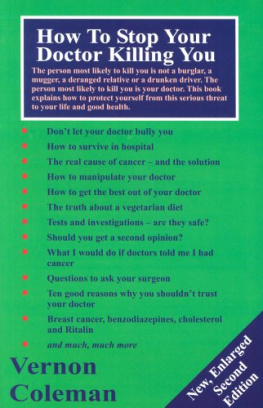Vernon Coleman - Dementia Myth: Most Patients With Dementia are Curable
Here you can read online Vernon Coleman - Dementia Myth: Most Patients With Dementia are Curable full text of the book (entire story) in english for free. Download pdf and epub, get meaning, cover and reviews about this ebook. year: 2019, publisher: EMJ Books, genre: Romance novel. Description of the work, (preface) as well as reviews are available. Best literature library LitArk.com created for fans of good reading and offers a wide selection of genres:
Romance novel
Science fiction
Adventure
Detective
Science
History
Home and family
Prose
Art
Politics
Computer
Non-fiction
Religion
Business
Children
Humor
Choose a favorite category and find really read worthwhile books. Enjoy immersion in the world of imagination, feel the emotions of the characters or learn something new for yourself, make an fascinating discovery.
- Book:Dementia Myth: Most Patients With Dementia are Curable
- Author:
- Publisher:EMJ Books
- Genre:
- Year:2019
- Rating:4 / 5
- Favourites:Add to favourites
- Your mark:
- 80
- 1
- 2
- 3
- 4
- 5
Dementia Myth: Most Patients With Dementia are Curable: summary, description and annotation
We offer to read an annotation, description, summary or preface (depends on what the author of the book "Dementia Myth: Most Patients With Dementia are Curable" wrote himself). If you haven't found the necessary information about the book — write in the comments, we will try to find it.
Dementia Myth: Most Patients With Dementia are Curable — read online for free the complete book (whole text) full work
Below is the text of the book, divided by pages. System saving the place of the last page read, allows you to conveniently read the book "Dementia Myth: Most Patients With Dementia are Curable" online for free, without having to search again every time where you left off. Put a bookmark, and you can go to the page where you finished reading at any time.
Font size:
Interval:
Bookmark:
Dementia Myth
Most Patients with Dementia Are Curable
Dr Vernon Coleman MB ChB DSc FRSA
Copyright Vernon Coleman 2019
The right of Vernon Coleman to be identified as the author ofthis work has been asserted in accordance with the Copyright, Designs andPatents Act 1988. All rights reserved.
First published as an eBook and a digital paperback on Amazon2019.
Published by EMJ Books
The author
Vernon Coleman MB ChB DSc FRSA has been a successfulcampaigning medical writer for 50 years. He has written over 100 books whichhave sold over two million copies in the UK alone, and been translated into 25languages. For more information please see www.vernoncoleman.com or visit VernonColemans author page on Amazon.
Contents
Preface
The diagnosis, treatment and reporting of dementia is amassive and previously unrecognised scandal. The staggering fact is that mostcases of dementia could probably be cured in a week or two maybe a littlelonger with some patients. Anyone who says otherwise is either woefullymisinformed or a drug company mouthpiece.
Around the world there are estimated to be around 50 millionpeople suffering from dementia though this figure is probably on the lowside. One half of all the patients admitted to nursing homes are said to besuffering from dementia of one sort or another.
Millions of patients who have been diagnosed with dementiaare being looked after by their families. Many family members have had toabandon their jobs and their normal lives in order to find the necessary timeto provide care for their loved ones. Millions more patients have been dumpedin hospitals and nursing homes where they sit or lie, waiting to die.
No one knows how many millions of as yet undiagnosedindividuals are struggling to cope with dementia, either alone or with the helpof relatives, friends and neighbours.
The commonest diagnosis for all these patients isAlzheimers disease. It is widely reputed that two thirds of patients withdementia are suffering from Alzheimers. Indeed, Alzheimers has in manycountries become the default diagnosis. If a patient has dementia then theywill be assumed to be suffering from Alzheimers and little or no effort willbe made to find any other diagnosis. The drug companies, the big charities, themedia and even some doctors seem to promote the view that the words dementiaand Alzheimers are pretty well interchangeable.
The prognosis for those diagnosed as suffering from Alzheimersdisease is a gloomy one for, despite many promises, there is still no cure forthis disease, nor is there any sign of a cure on the horizon. Drug companieshave produced a number of prescription only drugs recommended for use withAlzheimer patients, and alternative health care practitioners produce newremedies on an almost daily basis.
Despite all the promotion given to Alzheimers disease,there is however, clear evidence that many so-called dementia sufferers whohave been diagnosed as suffering from Alzheimers disease have beenmisdiagnosed. They are suffering from something quite different and could becured often completely and frequently within weeks or even days.
This short book is intended simply to draw attention to thisscandal and to provide pointers for those who feel that a loved one may havebeen misdiagnosed. My aim is not to provide a comprehensive guide to any of thediseases which cause dementia but, rather, to offer direction for those whomight otherwise be led into a fateful diagnosis when other more hopefulpossibilities might exist.
Some patients who have dementia will, of course, haveAlzheimers disease, and will be incurable. But if just one patient can berescued from a faulty diagnosis and returned to an active, productive life thenwriting this book will have been well worthwhile.
Dr Vernon Coleman MB ChB DSc FRSA
Some people believe that dementia is a normal part of the ageingprocess (hence the term senile dementia), but it is not. That is one of themany myths about dementia.
There are hundreds of thousands of people in their 80s and90s who still have all their mental faculties intact; thousands have gone on toachieve great things in their advanced years. Dementia is neither a natural noran inevitable consequence of ageing. (I wrote a short book called ClimbingTrees at 112 which list the achievements of a variety of elder citizens.)
The second myth is that dementia is not itself a disease.The word dementia is a general word for the symptoms displayed as a result ofa number of different diseases. (In much the same way that cancer andinfection arent specific diseases.)
When someone displays symptoms of dementia, its thedoctors job to identify the underlying cause.
Besides Alzheimers, other disorders that can cause dementiainclude: advanced syphilis, vitamin B12 deficiency, Huntingtons disease,Downs Syndrome, Picks disease, strokes, Lewy Body disease, late-multiplesclerosis, brain tumours, hormone deficiencies, chronic alcoholism, drug abuse(of both illegal and prescription drugs), head injuries, and idiopathic normalpressure hydrocephalus.
Nearly half of allindividuals with Parkinsons disease develop dementia, though this usuallyoccurs about 10 or 15 years after the disease has first been diagnosed.Dementia can also occur in a condition called Creutzfeldt-Jakob disease andVariant Creutzfeldt-Jakob disease. Dementia also sometimes occurs in the latestages of human immunodeficiency virus (HIV). And there is dementiapugilistica, also known as chronic progressive traumatic encephalopathy. Thisis a disorder which develops in people who have repeated head injuries boxersand American football players, for example and which produces symptomssimilar to Parkinsons disease. The boxer Muhammad Ali may, in my opinion, havebeen suffering from this disorder for the last years of his life. Theseindividuals may also develop normal pressure hydrocephalus. And there is acondition known as vascular dementia.
Quite a number of theless common types of dementia are treatable. So, for example, patients who havedeveloped dementia as a result of having a treatable brain tumour, patients whoare suffering from poisoning (as a result of toxins such as lead or mercury),patients who have syphilis, Lyme disease and other infective disorders andpatents who have myxoedema (an underactive thyroid gland) may all recover whentheir conditions are treated. Patients who develop dementia after a sudden headinjury may also make a good recovery.
Some of these aredisorders about which many doctors, including specialists know next to nothing.Relatives and friends of patients with dementia need to push hard to make surethat alternative causes of dementia are not ignored or forgotten for i tis crucial to remember that some of these disorders are treatable and adiagnosis of Alzheimers should never be made until all other disorders havebeen excluded.
To find the underlyingcause of a patients symptoms, a doctor needs to do quite a battery of tests. She or he may refer the patient to a neurologist at a hospitalor he or she may make a diagnosis based onsymptoms and medicalhistory alone. Whatever happens,the diagnosis should not be made without certain basic investigations beingconducted, and treatable conditions must be excluded before a diagnosis of (forexample) Alzheimers disease is made. It is sloppy and unprofessional to make adiagnosis of Alzheimers as a default diagnosis.
To claim that dementia is incurable is as absurd as sayingthat all people with broken legs will never walk again or that all patientswith chest infections will die. It is cruel, manipulative scaremongering, andthose who repeat this nonsense should be ashamed of themselves and theirignorance.
Next pageFont size:
Interval:
Bookmark:
Similar books «Dementia Myth: Most Patients With Dementia are Curable»
Look at similar books to Dementia Myth: Most Patients With Dementia are Curable. We have selected literature similar in name and meaning in the hope of providing readers with more options to find new, interesting, not yet read works.
Discussion, reviews of the book Dementia Myth: Most Patients With Dementia are Curable and just readers' own opinions. Leave your comments, write what you think about the work, its meaning or the main characters. Specify what exactly you liked and what you didn't like, and why you think so.

